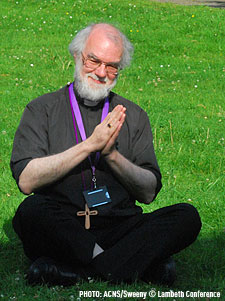The unfortunate truth of the Lambeth conference is that the only certain outcome has been a £1.2 million debt. As for the rest, opinions vary widely.
The conference convened amid a crescendo of criticism of the North American churches’ renegade actions in blessing same-sex unions and consecrating an actively homosexual bishop.
Most observers would have to concede that the absence of so many bishops made everyone aware of just what is at stake.
 But there was no outcome and no resolutions because, as many people failed to appreciate, there was never meant to be.
But there was no outcome and no resolutions because, as many people failed to appreciate, there was never meant to be.
The Archbishop of Canterbury promised there would be no decisions, just a lengthy round of ‘indaba’ groups.
The indaba process was taken from a Zulu method of dispute solving, which involves sitting under a tree and discussing until a compromise is reached.
One New Zealand bishop described the groups as ‘a joke’ and quipped that he was surprised “that no Zulu has stood up and taken us to account for our abuse of this process”.
Indeed such was the set-piece nature of the conference that no American newspaper sent staff correspondents to cover Lambeth.
Julia Duin of the Washington Times commented that her newspaper would not spend money on such a coverage because: “The upshot of Lambeth is that the Americans are going to continue ordaining homosexuals and celebrating same-sex blessings and the conservative foreign Anglican prelates will continue trespassing into American Episcopal dioceses on behalf of beleaguered conservatives. Nothing really changed.”
Orderly separation plan
The official figures have since revealed that The Episcopal Church sent the largest contingent of bishops, almost one quarter of the total.
They were well-funded and issued with strict media instructions on how to sell their case for pro-homosexual reform.
Such a strident approach upset many who had previously not been outspoken on the issue.
One was the Rt Rev Michael Scott-Joynt, the Bishop of Winchester, who said that the Archbishop of Canterbury was on the wrong path in his efforts at unity and needed to switch his attention to negotiating an ‘orderly separation’ in the Anglican Communion, to try to preserve what was left.
He told his diocese that the conference “has again convinced me that the Anglican Communion cannot hold in tension convictions and practices that are incompatible, and so not patent of ‘reconciliation’, without continuing seriously to damage the life and witness of Anglican Churches as much in ‘the Global South’ as in North America and in other provinces that have followed the lead of The Episcopal Church”.
In his strongest statement to date, Bishop Scott-Joynt, who is one of the five most senior bishops of the Church of England, said, “I cannot see that the members of an ‘international family of Churches’ can thrive and grow and offer a clear witness to Jesus Christ as Lord while offering contradictory teaching, on a matter as central as the character of the Holy Life, in different parts of a world knit together by instantaneous e-communications.”
Scandal and Judgement
Likewise, Anglican observer Andrew Carey wrote a strong comment entitled ‘A church under judgement”, in which he says that even disregarding the ‘virtual atheism’ of the the teaching of some of its leaders, the US Episcopal Church has been engulfed in scandal.
He wrote in the Church of England newspaper: ‘They've had thrice-divorced bishops, a child-abusing bishop, as well as one who's covered up sex abuse by his brother, a priest. There's been a drug-dealing priest, others who've been exposed in a pornographic magazine for engaging in bizarre sex with Brazilians. This is truly only the tip of the iceberg.”
Carey goes on. “With whole parishes and dioceses deserting the national Church amid such widespread heterodoxy and scandal, followed by a wave of litigation and squabbling over property, it's impossible to see The Episcopal Church as anything other than a disaster area.”
Against such a background, Bishop Scott-Joynt’s ‘orderly separation’ plea is not only understandable but, many would say, crucial.























